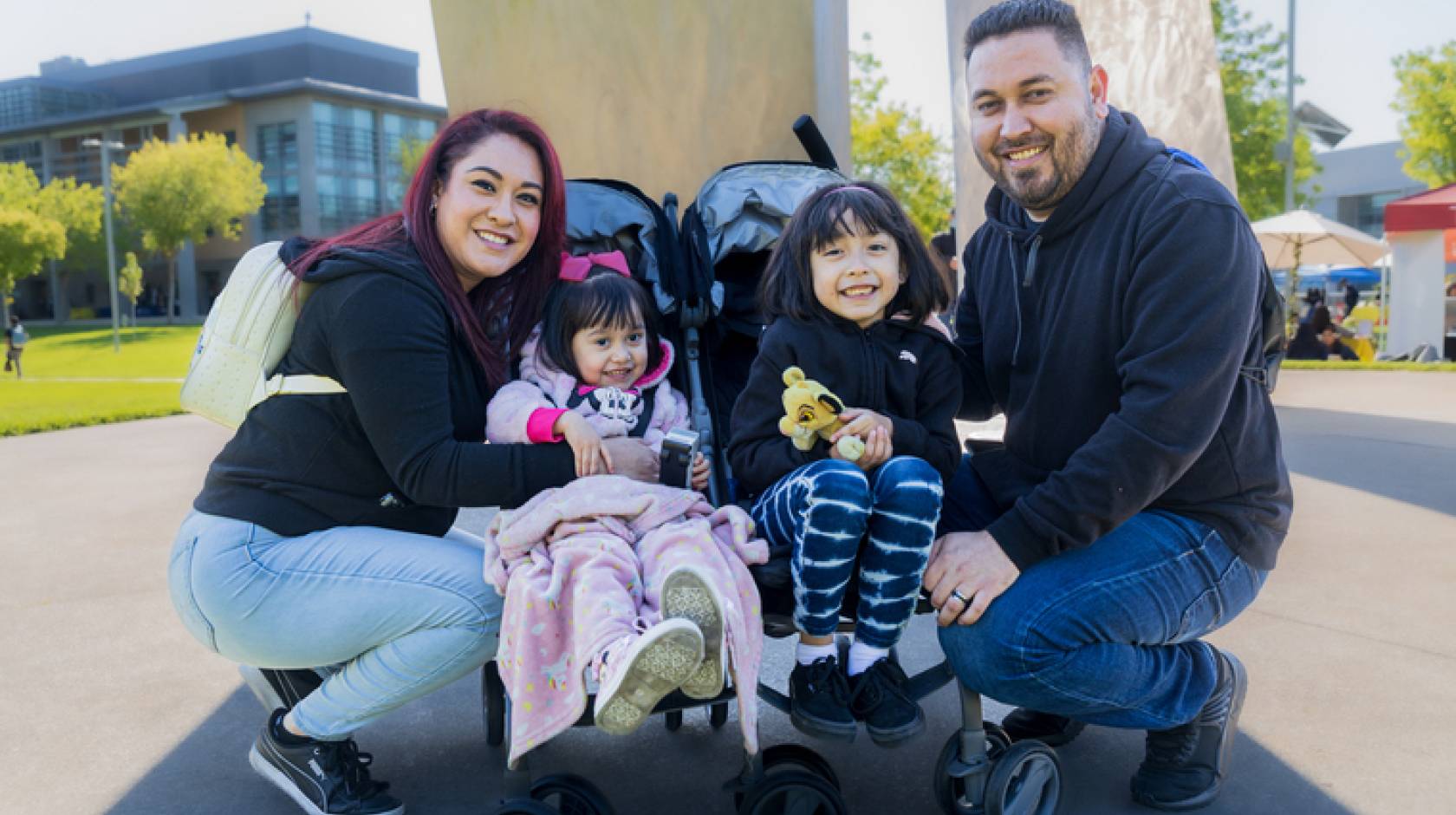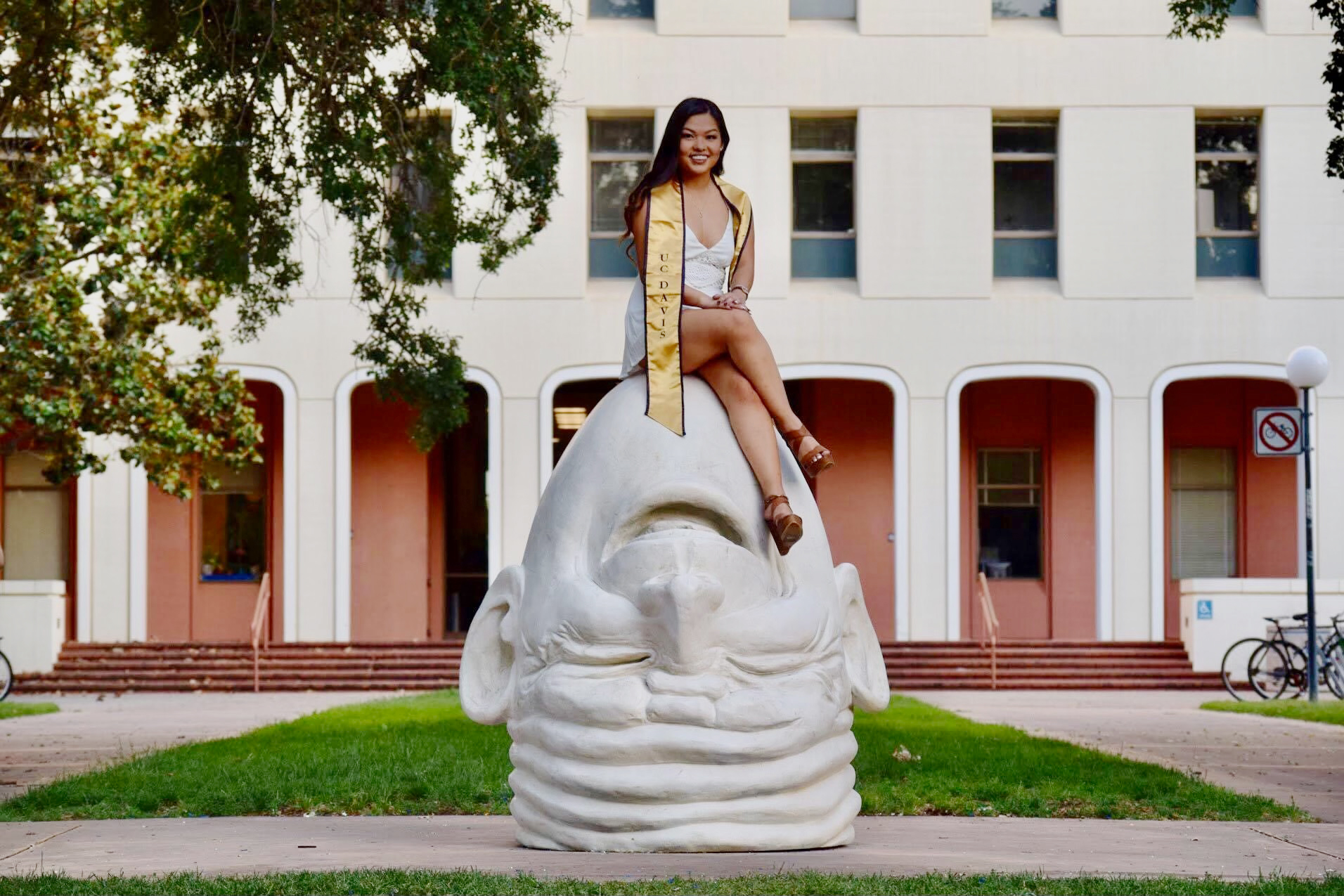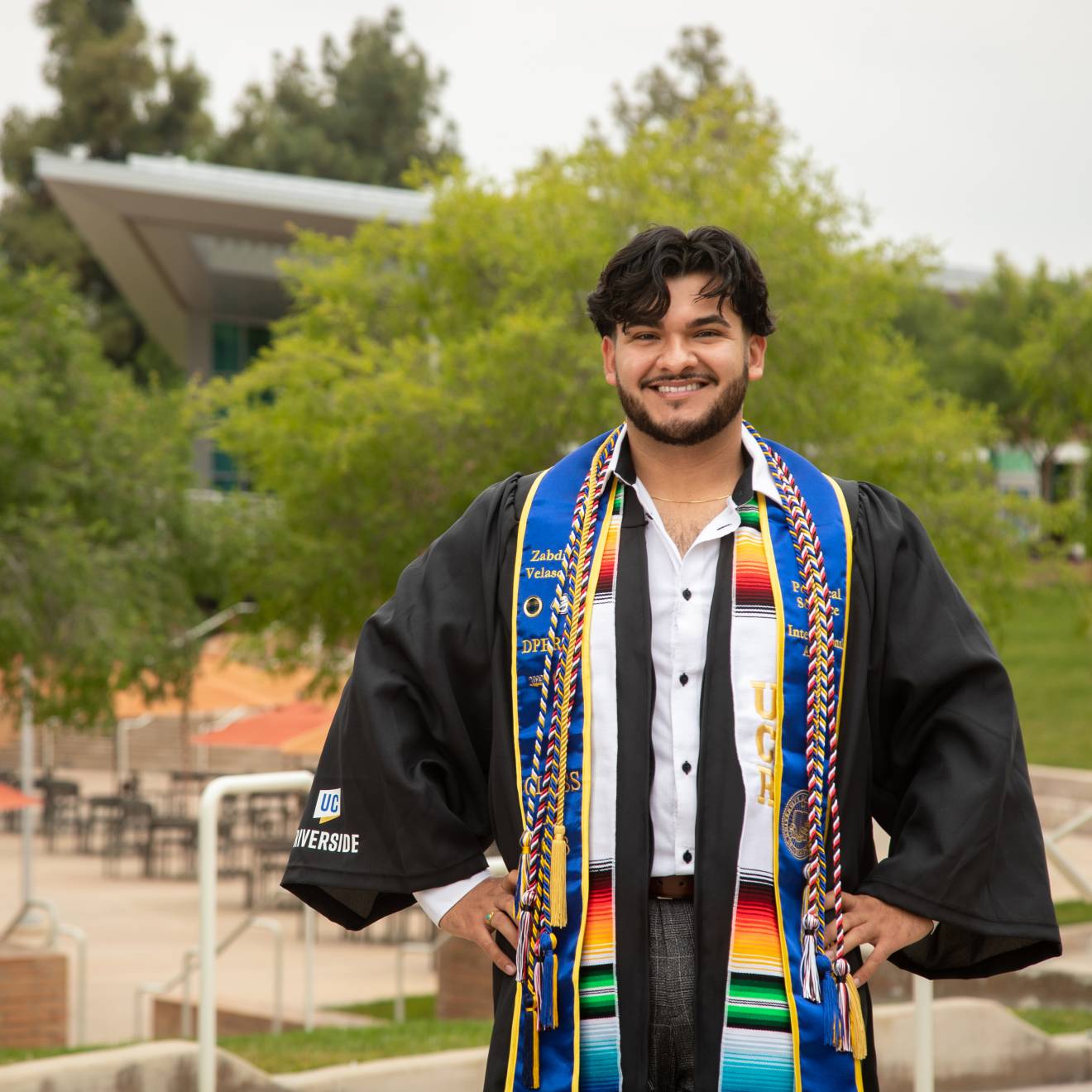Apollonia Morrill, UC Newsroom

Liliana Barron remembers when she first got the call. She was busy cooking while her kids played in their room down the hall when an advisor from UC Merced phoned to tell her about a new reenrollment program.
By the end of the conversation, Barron had signed up to return to college. “I was jumping up and down in my kitchen out of pure joy and disbelief,” she recalls with a big smile.
It had been almost 10 years since the Merced mother of two had paused her undergraduate studies. In the intervening time, she had never stopped thinking about that lost degree. She knew it would translate into professional opportunity, job security and, most important, expanded horizons for her two young daughters. “I didn’t even know if I was still eligible, or if my credits had expired,” she says. “But then here was someone telling me, ‘Here’s another chance, go for it!’”
Barron had tried twice in the past to earn a bachelor’s. A first-generation college student, she originally enrolled straight out of high school. After withdrawing for health reasons and then starting a family, she enrolled again five years later, this time as a mom. But as a student with a toddler in tow, the tactical hurdles were too high. From figuring out child care to navigating finances and paperwork, the stress was overwhelming. “There was no clear pathway, no support,” she remembers.
Now, a year after starting UC’s new Degree Completion Program, Barron is on track to earn a diploma in public health with a minor in psychology in the fall of 2024, with the goal of getting a master’s degree once she finishes. On top of that, she’s working part time for the reentry program, helping others like herself return to UC. “This has truly changed my life. It’s awakened something deep in me — I’ve found my calling.”
What’s making the difference? For Barron, it’s one-on-one, wraparound support services that take into account the many variables in her life, including all the complexities of work, family, health, finances and academics. That individualized approach is a hallmark of degree completion programs participating in the UC Reengagement Consortium (UCRC). Through its Extension office, UC Merced, along with UC Davis, UC Riverside and UC Santa Barbara, is part of UCRC’s collaborative effort to rethink how the University of California can best bring “stop-outs” — students who started but did not complete their degree — back to campus.
Across the nation, stop-outs miss out
Though UC’s graduation rate is high, with more than 86 percent completing their undergraduate studies, there are students each year who leave without earning their degree. While they withdraw from college for a host of reasons, a recent study found that UC stop-outs are overwhelmingly interested in returning to complete their degrees. Like Barron, many never stop thinking about going back for to college. Unfortunately, the problems that cause them to stop out in the first place may not ease with time, and new barriers can crop up as life’s responsibilities grow.
Nationally, it’s a big problem: There are 40.4 million stop-outs in the U.S., with recent numbers angling sharply upward as a result of the Covid-19 pandemic. At 6.63 million students, or 16.5 percent of the national total, California’s share of stop-outs is large. That adds up to a significant workforce development challenge for the state. Higher numbers of stop-outs translate into fewer degrees earned in California and a less well-educated workforce overall. That dip, along with declining college enrollment rates, could diminish California’s role as an economic heavyweight and a global engine of innovation.
Add to that a glaring societal failing: Across the country, the state and the UC system, a disproportionate number of stop-outs come from underserved populations — those who are first-generation, low-income or are Indigenous, Black or Latinx students.
For stop-outs, the problem is personal. The research is clear: the value of a bachelor’s degree is far-reaching. College graduates in the Golden State benefit from significant social mobility and higher lifetime earnings — 84 percent higher than those with only a high school diploma — a gap that continues to widen.
According to the data, a diploma opens the door to the middle class for most lower-income students, who quickly go on to earn more than their parents. A degree means increased job security and lower rates of unemployment and poverty. Degree holders are also more likely to have health insurance, be married, own a home or small business and vote. They have longer life expectancies by a full 7 years and report feeling happier with their lives.
Stop-outs lose out on those benefits, often at heartbreakingly close range to achieving them — some UC stop-outs need only one or two courses to complete their degrees.
So what’s stopping stop-outs from returning to school? Often the problem is financial, from accumulating unpaid fees to accessing loans, paying tuition and sometimes even just finding the money for the application fee. Other obstacles include geographic location, balancing classes with work and family, medical issues and child care. Another big one is the perception that to reenroll, you’ve got to face down a bureaucratic juggernaut, and some simply don’t know where to start.
UC’s Degree Completion Program aims to remove those barriers. Figuring out the best way to do that will provide a model that other universities and colleges can follow, and it represents an important opportunity for both personal and societal transformation, said UC Provost Katherine Newman: “This is one of the most important efforts the University of California is engaged in right now. It’s a major equity issue, and higher education is one of the most important levers we have for changing the landscape of inequality.”
Outreach and support that make the difference
Enter the UC Reengagement Consortium. The multicampus initiative includes bachelor’s degree completion programs housed in the Extension or Continuing and Professional Education offices and in partnership with academic units at UC Merced, UC Davis, UC Riverside and UC Santa Barbara.
Operating these programs from Extension has proven a successful strategy. “Extension is unique in its ability to be nimble and responsive to a population that looks very similar to the students we usually serve — adult learners,” says Marie Martin, associate dean of UC Riverside Extension. “We have a strong understanding of their needs.”
The first step in addressing those needs is thorough research to find out who — and where — the stop-outs are from each campus. This critical but labor-intensive step includes preparing a full manual review of each student’s case to understand what happened and what they might need to graduate. Between all four UCRC campuses, that adds up to more than 9,000 audits to date.
Outreach is next. In the past, the onus of reenrollment was on the student. UCRC turns that around; now it’s the reenrollment team that reaches out to draw students back in. When someone expresses interest, program staff quickly move to personal, one-to-one advising.
Stop-outs can be hesitant to take the first step of meeting with an advisor but have high rates of success once they do. Taking a holistic view and working with partners across campus, the advisor helps build a custom pathway for each student. This requires understanding an individual’s circumstances and helping them navigate the system to achieve their goals.
It’s crucial to figure out why it didn’t work the first time around, so both student and advisor are aware of potential pitfalls and can take care to avoid them. Advisors work with the student from the moment of reengagement through graduation. While they can’t make every problem go away, they can connect students with specialized resources, coach and advocate, and map out creative solutions.
“They don’t just send you off with a phone number or an email address, no. Your advisor works together with you to figure out what's going on, what’s keeping you from being successful. ‘Why is this happening? Let’s find the solution,’” said Liliana Barron, who now works part-time on the reenrollment team. “They are figuratively holding your hand, guiding you, and only once the solution is found do they let go.”
“So many students don’t realize that the door isn’t closed to them,” remarks Martin. “Not only do they still have an opportunity to come back, but there are also people here dedicated to supporting them and helping remove some of the barriers that previously prevented them from finishing school. This proactive outreach model didn’t exist in the past.”
The focus on uncovering root problems and building individualized solutions has made the pilot a treasure trove of information on how to improve student outcomes across the board, including helping prevent future stop-outs. Some of the lessons are already being applied for the general student population. UC Merced, for example, now has more touch points with students nearing completion of their studies to ensure that they know how and when to file a graduation application and have recourse if the deadline has passed.
It’s never too late to finish what you started
Like Liliana Barron, Tiffany Cha was also in the first generation of her family to go to college. She walked in the UC Davis commencement in the spring of 2016, just two classes short of her degree. She thought she’d be done by the end of that summer. But health issues cropped up, and months away from school turned into years. Cha always kept that missing degree in mind, especially as it became clear that she would be unable to advance in her career without it.
“I wasn’t sure if I would still be able to get my degree, and if it could still be from Davis,” she remembers. “I didn’t know if all the work I did would still stand because there was so much time in between. I thought, OK, there’s no way.”
That was, until she connected with the degree completion program at UC Davis Continuing and Professional Education in the fall of 2022. An advisor was able to help Cha connect the dots, and it turned out that community college courses she had taken in the interim would fulfill her graduation requirements. She received her diploma in the winter of 2023.

“Not having that piece of paper felt so draining. I thought about it almost every day. Having it now, I feel so much better about myself, so much more confident. I want others who haven’t finished their degree to know that there is still hope. It’s never too late to finish what you started.”
UCRC is still in pilot mode, but its members are committed to building systems that can scale across all UCs while still allowing differentiation for each campus. The consortium has graduated 64 students since March of 2022, with another 46 who have filed for graduation, 100 who have reenrolled or applied for readmission and 540 in advising. Thanks to the agility of UCRC, those numbers change daily, and the idea is to increase them exponentially as programs become established and roll out to other campuses. That growth is also part of a multipronged strategy to increase the number of UC degree holders by 200,000 students by 2030, while addressing equity gaps in student success.
“We’re listening to the data,” says Michael Pierick, UC Merced’s director of Extension and Degree Completion, who has been working on the reengagement program from its start. “Our goal is to share that we’re hearing from students and design a process that works. We’re building toward a system-wide approach that can move the needle on how we better serve adult learners through retention and reengagement.”
The deans of the four UCRC Extensions agree. “We’re proud of what’s been accomplished in a short amount of time,” says Kevin Vaughn, dean of UC Riverside Extension. “This is such an important equity effort for California students, and we are just getting started.”

